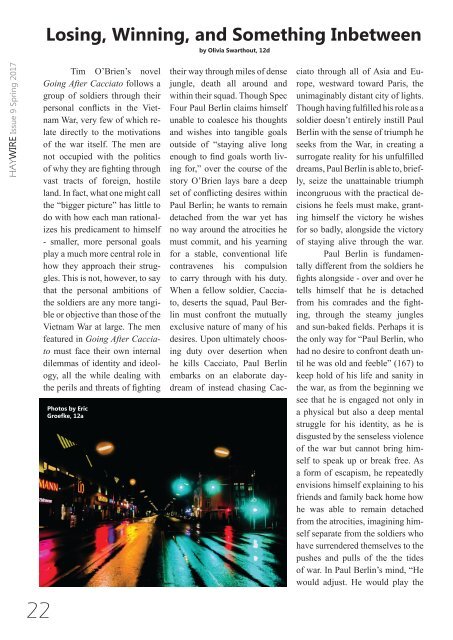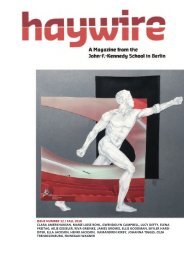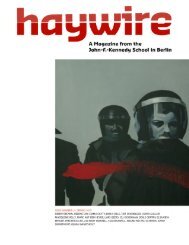HAYWIRE ISSUE 9 SPRING 2017
Literary art magazine from the John F. Kennedy School in Berlin
Literary art magazine from the John F. Kennedy School in Berlin
You also want an ePaper? Increase the reach of your titles
YUMPU automatically turns print PDFs into web optimized ePapers that Google loves.
Losing, Winning, and Something Inbetween<br />
by Olivia Swarthout, 12d<br />
<strong>HAYWIRE</strong> Issue 9 Spring <strong>2017</strong><br />
Tim O’Brien’s novel<br />
Going After Cacciato follows a<br />
group of soldiers through their<br />
personal conflicts in the Vietnam<br />
War, very few of which relate<br />
directly to the motivations<br />
of the war itself. The men are<br />
not occupied with the politics<br />
of why they are fighting through<br />
vast tracts of foreign, hostile<br />
land. In fact, what one might call<br />
the “bigger picture” has little to<br />
do with how each man rationalizes<br />
his predicament to himself<br />
- smaller, more personal goals<br />
play a much more central role in<br />
how they approach their struggles.<br />
This is not, however, to say<br />
that the personal ambitions of<br />
the soldiers are any more tangible<br />
or objective than those of the<br />
Vietnam War at large. The men<br />
featured in Going After Cacciato<br />
must face their own internal<br />
dilemmas of identity and ideology,<br />
all the while dealing with<br />
the perils and threats of fighting<br />
Photos by Eric<br />
Groefke, 12a<br />
their way through miles of dense<br />
jungle, death all around and<br />
within their squad. Though Spec<br />
Four Paul Berlin claims himself<br />
unable to coalesce his thoughts<br />
and wishes into tangible goals<br />
outside of “staying alive long<br />
enough to find goals worth living<br />
for,” over the course of the<br />
story O’Brien lays bare a deep<br />
set of conflicting desires within<br />
Paul Berlin; he wants to remain<br />
detached from the war yet has<br />
no way around the atrocities he<br />
must commit, and his yearning<br />
for a stable, conventional life<br />
contravenes his compulsion<br />
to carry through with his duty.<br />
When a fellow soldier, Cacciato,<br />
deserts the squad, Paul Berlin<br />
must confront the mutually<br />
exclusive nature of many of his<br />
desires. Upon ultimately choosing<br />
duty over desertion when<br />
he kills Cacciato, Paul Berlin<br />
embarks on an elaborate daydream<br />
of instead chasing Cac-<br />
ciato through all of Asia and Europe,<br />
westward toward Paris, the<br />
unimaginably distant city of lights.<br />
Though having fulfilled his role as a<br />
soldier doesn’t entirely instill Paul<br />
Berlin with the sense of triumph he<br />
seeks from the War, in creating a<br />
surrogate reality for his unfulfilled<br />
dreams, Paul Berlin is able to, briefly,<br />
seize the unattainable triumph<br />
incongruous with the practical decisions<br />
he feels must make, granting<br />
himself the victory he wishes<br />
for so badly, alongside the victory<br />
of staying alive through the war.<br />
Paul Berlin is fundamentally<br />
different from the soldiers he<br />
fights alongside - over and over he<br />
tells himself that he is detached<br />
from his comrades and the fighting,<br />
through the steamy jungles<br />
and sun-baked fields. Perhaps it is<br />
the only way for “Paul Berlin, who<br />
had no desire to confront death until<br />
he was old and feeble” (167) to<br />
keep hold of his life and sanity in<br />
the war, as from the beginning we<br />
see that he is engaged not only in<br />
a physical but also a deep mental<br />
struggle for his identity, as he is<br />
disgusted by the senseless violence<br />
of the war but cannot bring himself<br />
to speak up or break free. As<br />
a form of escapism, he repeatedly<br />
envisions himself explaining to his<br />
friends and family back home how<br />
he was able to remain detached<br />
from the atrocities, imagining himself<br />
separate from the soldiers who<br />
have surrendered themselves to the<br />
pushes and pulls of the the tides<br />
of war. In Paul Berlin’s mind, “He<br />
would adjust. He would play the<br />
22

















